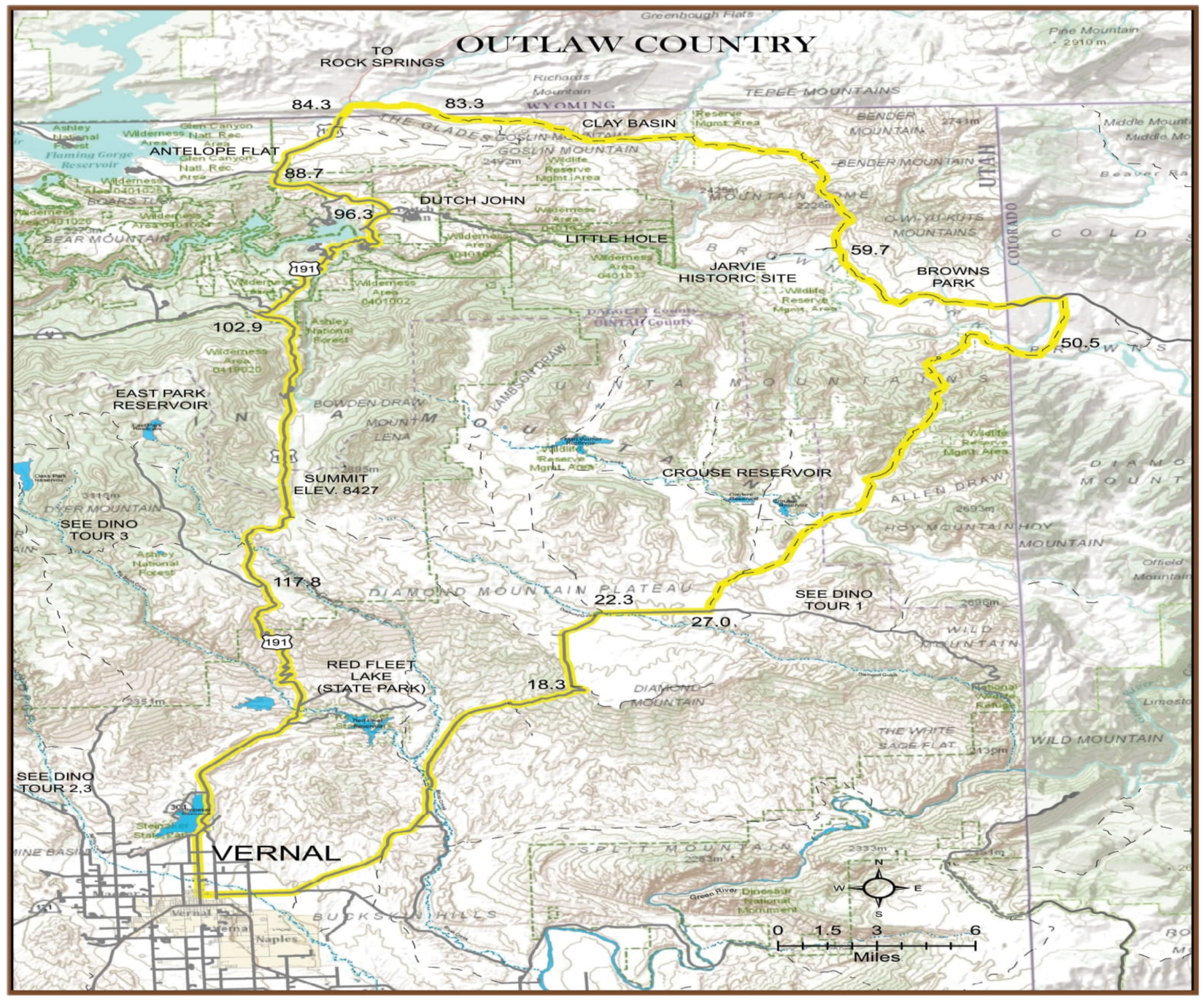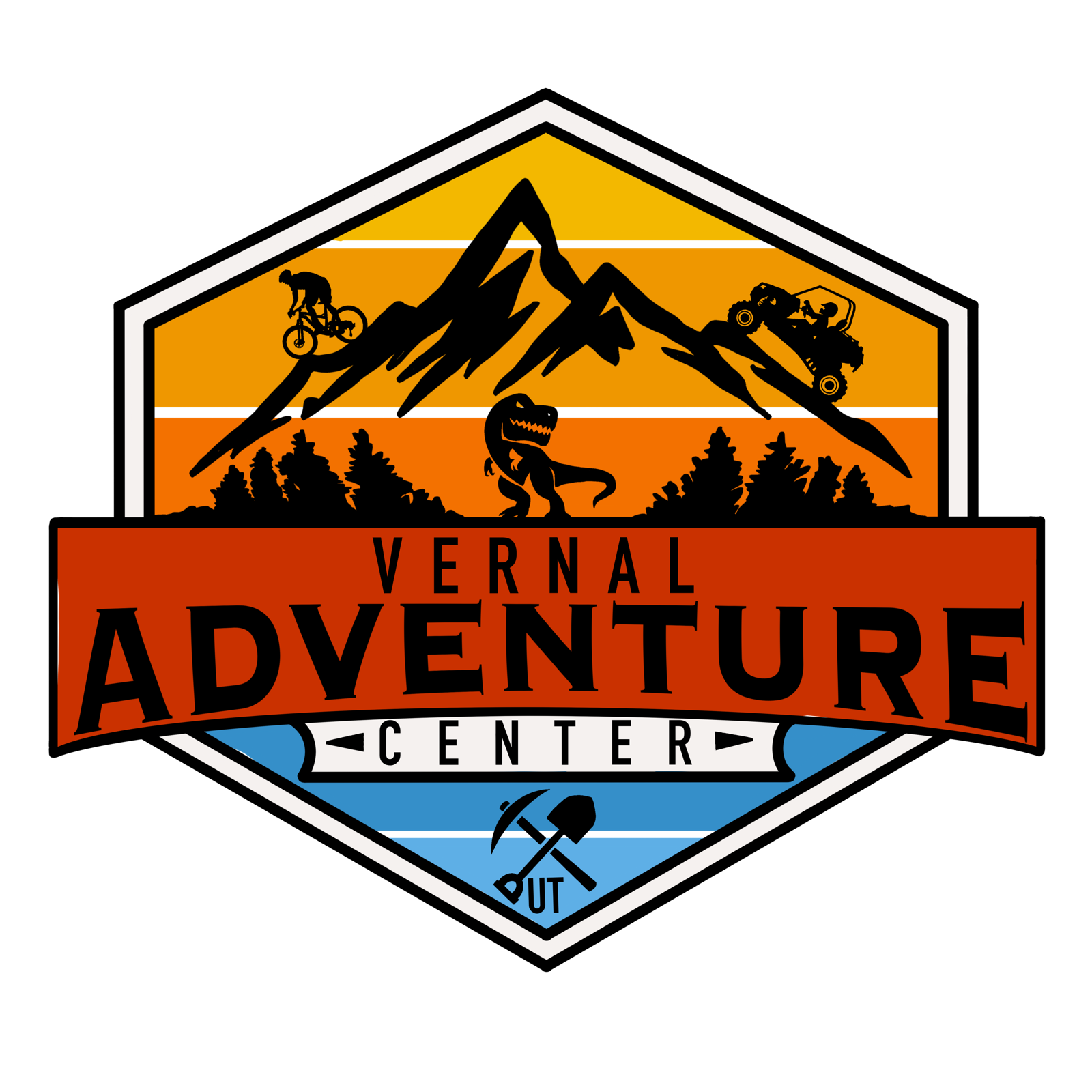Outlaw Country:
Crouse Canyon, Brown’s Park Jarvie’s Ranch, Jessie Ewing Canyon (Butch Cassidy Country)
Scenic Byway & Backway
This area has always been a land of adventure. In the early days tribes of Ute and Shoshoni, along with fur trappers, spent their winters in the region enjoying an abundance of game and mild winters. In the 1870s, explorer John Wesley Powell traveled through the region on two separate trips and was responsible for naming a number of geographic features in the area. One such feature is Swallow Canyon named by Powell for its abundance of cliff swallows.
Brown’s Park is mostly known for its outlaw history. Its remote location and close proximity to the state boundaries of Wyoming and Colorado gave it lots of appeal for those fleeing the law. Some of the best-known outlaws included Butch Cassidy and the Wild Bunch, Matt Warner, Kid Curry, Harry Tracy, and others. It’s interesting that residents of Brown’s Park said the Wild Bunch was always welcome in the Park as long as no crimes were committed against its residents. If they committed a crime, they would be run off.
Brown’s Park itself is described as a region that has never had an incorporated town or village. As a matter of fact, it has never even had a sheriff. There was a time in the late 1800s when the sheriff did venture over from Vernal but turned around when he entered Brown’s Park for fear of his life.
As you travel in this area today, there is no need to fear the inhabitants. The people are friendly, but there is still that element of adventure. If you’re looking for the “wild” side of things, you might try the Brown’s Park State Waterfowl area of the Brown’s Park National Wildlife Refuge. An abundance of wildlife awaits you throughout much of the year. There have even been moose sighted on a regular basis in both of these areas.
Another highlight is the Swinging Bridge. This cable suspension bridge is one of the few still in operation in the West. The boards creak as you cross the bridge and step back in time to the days of outlaws and cattle rustlers. It makes you wonder just who may have crossed in days gone by.
Across Swinging Bridge on the south side, the road winds through a scenic steep and narrow canyon along Crouse Creek, while on the north side the road winds through Jessie Ewing Canyon.
The John Jarvie Homestead was first settled in 1880. The 35-acre homestead once boasted a post office, trading post, and river ferry. It was a regular stopping place for travelers and a secret meeting place for outlaws. The Jarvie site has been historically reconstructed to include John Jarvie’s original dugout home, blacksmith shop, and store, as well as a cemetery and museum.

Mileage
0 Leave Vernal from the intersection of Main and Vernal Avenue going north.
0.5 Turn right on 500 North Street.
2.9 Junction–take the left road. You are leaving Ashley Valley and the next five miles take you over a quite barren bench where little grows except sparse sagebrush and a few other hardy plants. This range is grazed by sheep during the winter.
7.8 Junction-take left road (road to Island Park and Rainbow Park). 10 Junction-take right road across the creek. This is the low point on the tour, 5,300 feet, and you now begin an eight-mile climb to the rim of Diamond Mountain Plateau.
15.7 Junction-keep left (right is dead end road). The sagebrush of the area is now giving way to cedar and pinon pine.
18.3 Junction-take left road (right follows rim to dead end). The rim is just under 8,000 feet in elevation. You have climbed about 2,600 feet since leaving Brush Creek. The Diamond Mountain Plateau is partly privately owned and public lands. Please obey “no trespassing” signs. The fields you see are mostly winter wheat and on private land. The plateau is rolling terrain covered mostly by sagebrush and grass with aspen and pine on the higher slopes. This is deer and elk country and a favorite hunting ground for the modern sportsman just as it was in the past for Indians, mountain men, outlaw bands, and our early settlers. Other wildlife inhabiting this great plateau which you might see if you have a sharp eye and little luck are sage grouse, coyote, rabbit, bobcat, mourning dove, many species of hawks, and golden eagles. Cattle were driven through this country from Texas to the railroad in southern Wyoming in the days of the early West, nearly 100 years ago.
22.3 Diamond Gulch Junction-continue ahead (left to U-44 and US 191, an alternate return route). You are now crossing trails ridden by the notorious outlaw bands of the late 1800s. Such men as Matt Warner (long associated with Butch Cassidy), Elza Lay, and other bad men had cattle “spread” on Diamond Mountain during their era.
27.0 Turn left off the pavement to Crouse Canyon and Brown’s Park Scenic Backway.
29.3 Junction-turn right to Crouse Canyon.
32.3 On the left you can see a portion of Crouse Reservoir, a facility operated by the State of Utah, and a fine stop for lunch.
41.4 The mouth of Crouse Canyon. High red-rock walls and breathtaking scenery as you enter Brown’s Park.
43.8 Brown’s Park. As you enter the region you are stepping back in time to the days of outlaws and cattle rustlers and a taste of the Old West. Brown’s Park is a region and never was an actual town. The term “park” refers to the open appearance of the area.
44.7 Junction-tour continues straight ahead. (Road to the left goes to Taylor Flat.) This road is best for trailers as it is wider than the swinging bridge.
47.3 Entering Brown’s Park National Waterfowl Refuge. The Green River can be seen on the left. Good birding opportunities.
50.5 Suspension bridge crossing Green River. The original bridge sign read “Load limit 200 sheep, 30 cattle or 3 1/2 ton gross.” The bridge is very narrow.
51.5 Junction-tour route turns left (the road to the right goes to Maybell, Colorado).
53.3 Utah Colorado State line.
55.5 Junction route turns left (right to Rock Springs, Wyoming).
59.7 Junction-route straight ahead (left is a side trip to Jarvie Historic Site, 3 miles).
62.7 Jarvie Ranch. Historic trading post from the 1800s. Guided tours daily 10-5 p.m., May to October. Self-guided tour brochures are also available at the ranch. Return to the main route and enter Jesse Ewing Canyon.
63.2 Entering Jesse Ewing Canyon. This canyon is very narrow and quite winding. The canyon is named after one of the early settlers of this area. Crouse Canyon was also named after an early settler. Fourteen percent grade, not recommended for trailers. On the left of the canyon, you can see the remains of an old mine. There are several of these mines in this canyon.
66.4 Clay Basin. This is an underground natural gas storage facility.
69.0 The mountain straight ahead is Goslin Mountain. This mountain has a flat plateau where deer, elk, and antelope may be seen.
69.3 Junction-tour turns left to Dutch John.
70.6 Red Creek-named because the silt carried down the stream during flood stages is bright red.
72.4 The entrance to Pigeon Canyon is to the right. This canyon is named after Bill Pigeon who was shot in 1897 and is buried in this canyon.
73.7 Edith Aspen Park to the left. This is a nice secluded picnic area.
79.4 Utah-Wyoming State Line.
82.3 Junction-tour continues left on US 191 (right to Rock Springs Wyoming).
82.6 Minnie’s Gap
83.1 Utah-Wyoming line, entering Utah.
83.8 Junction with Flaming Gorge- Uintas Scenic Byway (US 191). Turn left, and travel 0.5 miles to Scenic Byway Portal Sign. Stop at the portal sign for information on Scenic Byway sites.
84.3 Flaming Gorge-Uintas Scenic Byway portal Sign and Interpretive Site (end of the tour, beginning of Flaming Gorge-Uintas Scenic Byway Tour…refer to the Byway Brochure).
